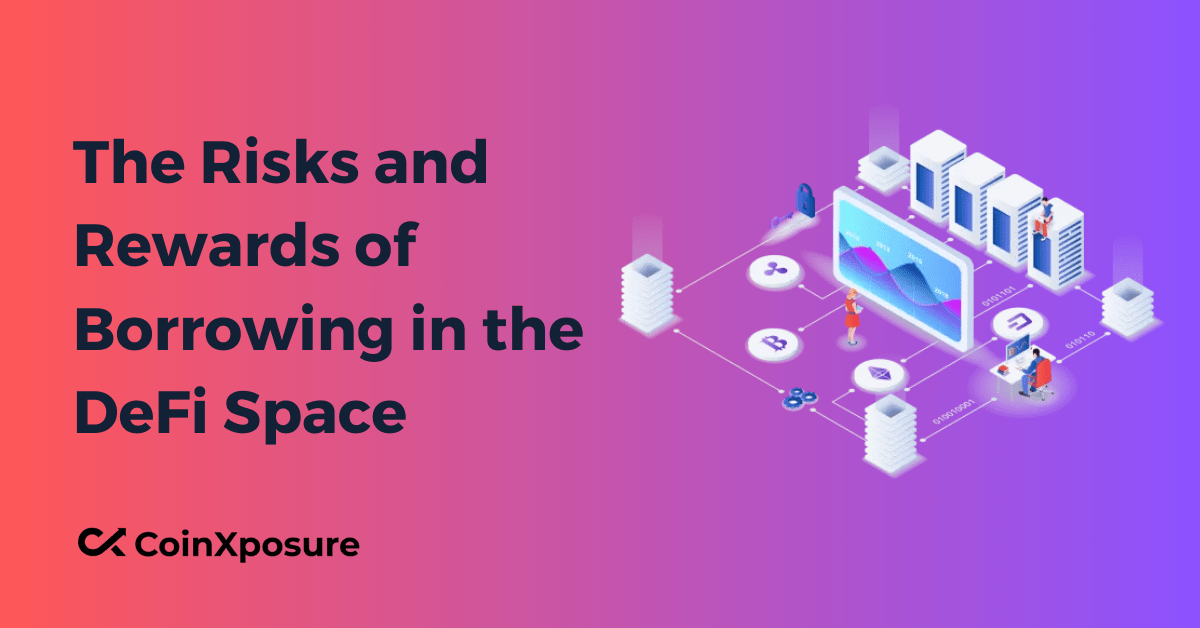In the rapidly expanding realm of Decentralized Finance (DeFi), borrowing has emerged as a pivotal component, offering individuals unprecedented access to financial services.
However, navigating the DeFi lending landscape entails balancing enticing risks and rewards.
This exploration delves into the dynamics of borrowing within the decentralized framework, shedding light on the opportunities that arise alongside the challenges that demand careful consideration.
Understanding the nuances of these risks and rewards is crucial for individuals seeking to harness the potential of DeFi while safeguarding their financial interests.
Risks of Borrowing in DeFi
Borrowing in the decentralized financial space (DeFi) presents a range of risks that users must be mindful of.
The decentralized nature of these platforms introduces unique challenges that borrowers should consider when engaging in lending protocols. Now, let’s explore these risks:
- Smart contract vulnerabilities:
- Potential exploits due to coding vulnerabilities.
- Security risks associated with decentralized platforms.
- Market volatility:
- Fluctuations in the value of collateral assets.
- Risks of liquidation in highly volatile market conditions.
- Regulatory uncertainty:
- Lack of a clear regulatory framework in the DeFi space.
- Potential legal implications for borrowers in evolving regulatory landscapes.
Rewards of Borrowing in DeFi
Borrowing in the decentralized financial space (DeFi) offers a spectrum of rewards contributing to its growing popularity. Here are some key benefits:
- Accessibility and Inclusivity:
- Global access to financial services without traditional banking barriers.
- Lower entry thresholds, enabling a more inclusive financial ecosystem.
- Decentralization Benefits:
- Elimination of intermediaries, fostering peer-to-peer transactions.
- Transparency and trustlessness through smart contract automation.
- Competitive Interest Rates:
- Comparison with traditional finance often reveals more competitive interest rates.
- Opportunities for yield farming, allowing borrowers to earn additional rewards.
Exploring these rewards highlights the potential for DeFi borrowing to reshape financial dynamics and provide users with novel opportunities for financial participation.
Risk Management Strategies
Effective risk management is crucial when borrowing within the decentralized financial space (DeFi). Here are key strategies to mitigate risks:
- Due Diligence on DeFi Protocols:
- Conduct thorough audits and security assessments of the chosen lending platform.
- Consider the protocol’s reputation and user feedback within the community.
- Diversification of Collateral:
- Spread risk by using a diverse range of collateral assets.
- Avoid concentration in volatile assets to minimize exposure to market fluctuations.
- Monitoring and Adapting to Market Conditions:
- Regularly assess collateral ratios to ensure they align with protocol requirements.
- Stay informed about market dynamics and be prepared to adjust strategies accordingly.
Implementing these risk management strategies enhances the resilience of DeFi borrowing, providing users with a more secure and informed financial experience.
Conclusion
Navigating the borrowing landscape in the decentralized financial space (DeFi) demands a nuanced understanding of the risks and rewards involved.
While DeFi introduces unprecedented accessibility and transparency, it also brings unique challenges such as smart contract vulnerabilities, market volatility, and regulatory uncertainties.
To navigate these challenges, individuals must adopt robust risk management strategies.
Conducting due diligence on DeFi protocols, diversifying collateral, and staying vigilant about market conditions are integral to safeguarding financial interests.
As the DeFi space evolves, the balance between risks and rewards remains dynamic. Informed decision-making, ongoing vigilance, and adaptation to the evolving landscape will be essential for users seeking to harness the potential of DeFi borrowing responsibly.
By doing so, participants can capitalize on the benefits while mitigating the inherent risks, contributing to the maturation and sustainability of decentralized finance.












